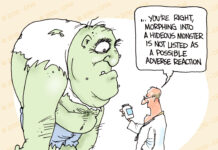Psychotropics Linked to Worse Physical Problems and Mortality in Psychiatric Patients
Common psychotropic medications may be contributing to the higher rates of physical illnesses and mortality in people diagnosed with mental illnesses.
Antidepressants Associated With Increased Driving Risk
Researchers from the Taiwan and the United States find through a study of 5,183 subjects with motor vehicle accidents (MVAs) and 31,093 matched controls...
Guidelines Recommending Antidepressants “in Contradiction with the Current Evidence”
Researchers critique the German S3 guidelines for depression promoting antidepressants.
Study Links Antidepressants and Decreased Coping Behaviors Across Generations
Biologists found that exposure to antidepressants suppresses important survival behaviors in zebrafish, an effect that persisted across three generations and was found to be more severe for males.
Over 1,000 Antidepressant Users Describe how Their Personal Life has Been Affected
Survey examines adverse personal and interpersonal effects of antidepressants and the impact of polypharmacy
What Is the Risk of Permanent Sexual Dysfunction from Antidepressants?
Males taking antidepressants were at 100 times the risk of erectile dysfunction compared with the healthy population and more than three times the risk even after controlling for other variables.
Common Side Effects Leading to Antidepressant Discontinuation
New research finds the negative drug effects most commonly associated with initiating antidepressant discontinuation are anxiety, suicidal thoughts, vomiting, and rashes.
Antidepressant is Toxic to Fungus
Zoloft isn't just for depression any more; it also kills fungal meningitis. Researchers from Texas A&M find that "The problem for many current antifungal...
Bipolar Patients Have High Drug Burden — Especially Women
Over one third of people with bipolar diagnoses admitted to a Rhode Island hospital were on four or more psychiatric medications, says research published...
Psych Med Prescribing After Perinatal/Neonatal Death
Research from MIA blogger Jeffrey Lacasse finds that "at present, there exists no rigorous evidence to support the prescription of Ads (antidepressants) in bereavement....
Researchers: “Antidepressants Should Not be Used for Adults with Major Depressive Disorder”
A new review, published in BMJ Evidence-Based Medicine, concludes that antidepressants should not be used as the risks outweigh evidence for benefits.
Antidepressants Actually Reduce Serotonin Levels
Common scientific beliefs about serotonin levels in depression and how antidepressants act on the brain appear to be completely backwards.
“Medicine Is Awesome” Mentality Fueling Harmful Antidepressant Use, Say Experts
The authors call for a paradigm shift in mental health care that emphasizes empathy, context, and alternatives to medication as first-line treatments for depression.
Suicide in the Age of Prozac
During the past twenty years, the American Foundation for Suicide Prevention and American psychiatry have adopted a "medicalized" approach to preventing suicide, claiming that antidepressants are protective against suicide. Yet, the suicide rate in the United States has increased 30% since 2000, a time of rising usage of antidepressants. A review of studies of the effects of mental health treatment and antidepressants on suicide reveals why this medicalized approach has not only failed, but pushed suicide rates higher.
SSRIs May Cause Bone Loss
An Israeli study of 10,621 women found that those taking an SSRI more than 80% of the time were 1.4 times more likely to...
Antidepressant-linked Suicide Data Doctored In Seminal Study
Several years after the information was first revealed, a published study has shown how an influential NIMH study doctored the real data about antidepressants and suicidal events in youth.
Antidepressants Linked to Lasting Sexual Dysfunction, Study Finds
New research highlights the challenges in quantifying the prevalence of Post-SSRI Sexual Dysfunction (PSSD), a condition that continues to affect patients long after they stop taking antidepressants.
Clinical Trials Show Antidepressants “Not Beneficial in the Long Term”
Clinical trials also consistently fail to measure and report long-term harmful effects.
Antidepressant Use Continues to Climb Among Youth on Medicaid
New study finds that Medicaid enrolled youth were 14 times more likely to be on an antidepressant in 2014 than in 1987.
Do Not Prescribe Antidepressants for Mild to Moderate Depression or at First Visit
World Psychiatry article challenges conventional antidepressant prescription practices.
SSRIs Cause Delayed Head Growth and Premature Birth
In a study of 7,696 pregnant women, researchers in the Netherlands and the U.S. found that SSRIs caused slower head growth and premature birth....
Systematic Review Finds Antidepressants Double the Risk for Agitation and Violence in Healthy Volunteers
The Nordic Cochrane Center conducted a systematic review of existing research trials on antidepressants and found that the drugs doubled the risk of feelings...
Antidepressant Use and Cognitive Impairment After Menopause
A study of 6,998 postmenopausal women followed over 7.5 years found that antidepressant use correlated with a 70% increased risk of cognitive impairment. The...
Clinical Trials Underreport Harms of Antidepressant Medications
A group of researchers recently found serious bias in the reporting of harm due to adverse events in antidepressant medication clinical trials. They report...
Official Guidelines on Antidepressant Discontinuation Fail Practitioners and Patients
A review of clinical practice guidelines for antidepressant discontinuation from across the English-speaking world reveals major pitfalls.
























